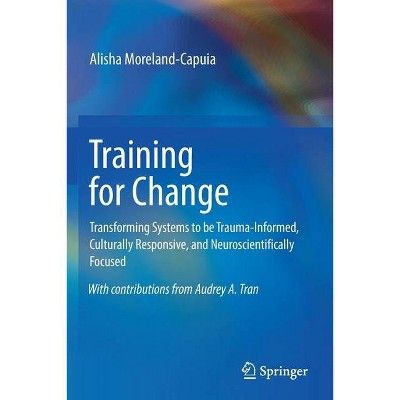Training for Change - by Alisha Moreland-Capuia (Paperback)

Similar Products
Products of same category from the store
AllProduct info
<p/><br></br><p><b> Book Synopsis </b></p></br></br><p>This book offers an integrated training and coaching system to facilitate change in systems that serve youth (education, healthcare, and juvenile justice). The integrated training and coaching system combines brain development, cultural responsivity, and trauma-informed practices. The book provides a comprehensive overview of the neurobiology of fear, brain development, trauma, substance use, and mental health, structural bias and environmental factors that pose a threat to healthy brain development. The book employs practical applications/recommendations and case examples that help solidify understanding of key concepts. Each chapter begins with a set of objectives and interactive exercises that builds on the next, thoughtfully challenging the reader (and giving specific, practical ways for the reader) to apply the information presented with the goal of "change". The text is written from the perspective of a trauma-informed addiction psychiatrist who has effectively facilitated systems change.</p> <p>Topics featured in this book include: </p><p></p><ul><li>Common threats to healthy brain development.</li><li>The neurobiology of trauma.</li><li>Applying trauma-informed practices and approaches.</li><li>Cannabis and its impact on the brain.</li><li>Labeling theory and implicit bias.</li><li>Exploring the connection between fear and trauma.</li><li>Rehabilitation versus habilitation.</li><li>Managing stress through mindfulness.</li></ul><p></p> <p>Training for Change will be of interest to graduate and advanced undergraduate students and researchers in the fields of cognitive psychology, criminology, public health, and child and adolescent development as well as parents, teachers, judges, attorneys, preventative medicine and pediatric providers.</p><br><p/><br></br><p><b> From the Back Cover </b></p></br></br><p>This book offers an integrated training and coaching system to facilitate change in systems that serve youth (education, healthcare, and juvenile justice). The integrated training and coaching system combines brain development, cultural responsivity, and trauma-informed practices. The book provides a comprehensive overview of the neurobiology of fear, brain development, trauma, substance use, and mental health, structural bias and environmental factors that pose a threat to healthy brain development. The book employs practical applications/recommendations and case examples that help solidify understanding of key concepts. Each chapter begins with a set of objectives and interactive exercises that builds on the next, thoughtfully challenging the reader (and giving specific, practical ways for the reader) to apply the information presented with the goal of "change". The text is written from the perspective of a trauma-informed addiction psychiatrist who has effectively facilitated systems change.</p><p>Topics featured in this book include: </p><p></p><ul><li>Common threats to healthy brain development.</li><li>The neurobiology of trauma.</li><li>Applying trauma-informed practices and approaches.</li><li>Cannabis and its impact on the brain.</li><li>Labeling theory and implicit bias.</li><li>Exploring the connection between fear and trauma.</li><li>Rehabilitation versus habilitation.</li><li>Managing stress through mindfulness.</li></ul><p></p><p><i>Training for Change</i> will be of interest to graduate and advanced undergraduate students and researchers in the fields of cognitive psychology, criminology, public health, and child and adolescent development as well as parents, teachers, judges, attorneys, preventative medicine and pediatric providers.</p><p/><br></br><p><b> About the Author </b></p></br></br><p><b>Dr. Alisha Moreland-Capuia </b>grew up in Portland, Oregon. She graduated from Stanford University in 2002 with a B.S. in biological sciences and a minor in urban studies. She earned her doctor of medicine from the George Washington University School of Medicine in 2007. She completed four years of psychiatry residency and an addiction fellowship at Oregon Health and Science University. She is double board certified in addiction and general adult psychiatry. </p> She has trained judges, parole officers, school teachers, community members and faith based institutions in the areas of cultural responsivity, brain development and trauma informed approaches and practices. She built a program entitled Healing Hurt People Portland - a hospital based, trauma-informed, community focused youth violence prevention program that serves young males of color between the ages of 15-33 who've been stabbed, shot and or assaulted.<p></p> <p>She has committed her professional career to changing systems to optimally serve youth. Dr. Alisha is also the Co-Founder of The Capuia Foundation and believes in serving the global community. Through the Foundation, she and her family built a primary care clinic in Angola, Africa, which provides subsidized primary and preventative care services for Angolans. Annually, she travels to Angola, Africa to serve patients in the family-built clinic. The establishment of the clinic inspired the construction of roads and improved access to water, lights and jobs for the surrounding Angolan community. Dr. Alisha has a history of building "with" people and community. </p> <p>Her working motto is that systems change when people change and people change when they "feel" something. Dr. Alisha has passionately committed herself to working at the people level (getting them to connect with their "feeling space", also known as the birth place for change) as a means of systems change.</p> <p>She's had the privilege of bearing witness to people and systems changing.This textbook is most about "people-individual work and change" that results in "system work and change". Changed people change systems.</p><br>
Price History
Price Archive shows prices from various stores, lets you see history and find the cheapest. There is no actual sale on the website. For all support, inquiry and suggestion messagescommunication@pricearchive.us




















